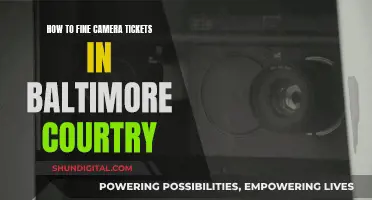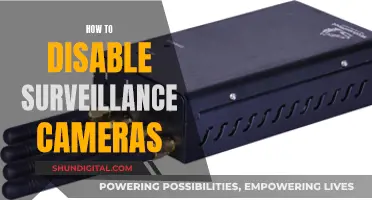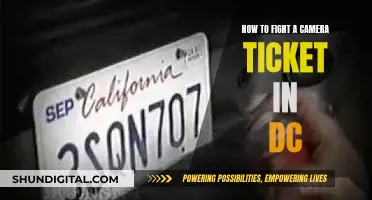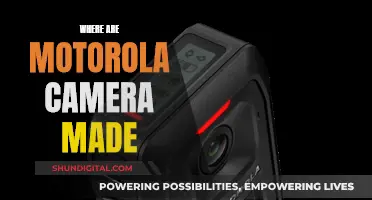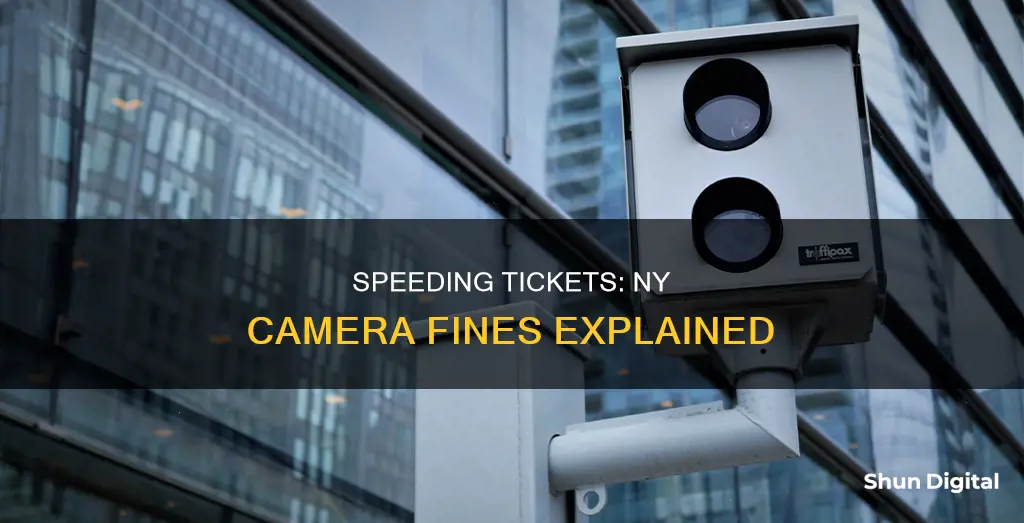
New York has implemented a range of measures to tackle speeding and improve road safety. These include the use of traffic cameras to detect speeding, running red lights, and travelling in prohibited lanes. The Automated Work Zone Speed Enforcement (AWZSE) program, established in 2021, has seen over 130,000 work zone speeding violations issued, with fines totalling over $4 million. The state's speed camera network has also been linked to a rise in 'super speeders', with a number of drivers accumulating hundreds of violations. This has prompted concerns from safe streets advocates about the potential for deadly crashes involving repeat offenders. New York City's speed cameras issued over 4.4 million violations in 2023, resulting in fines of over $220 million. The city's school zone speed camera program has expanded, with cameras now operating 24/7, and the state has also introduced highway work zone speed cameras to target speeding in construction areas.
| Characteristics | Values |
|---|---|
| Name of the program | Automated Work Zone Speed Enforcement (AWZSE) |
| Managing Authorities | New York State Department of Transportation (DOT) and New York State Thruway Authority |
| Fine for the first violation | $50 |
| Fine for the second violation | $75 (if within an 18-month period of the first violation) |
| Fine for the third and subsequent violations | $100 (if within an 18-month period of the first violation) |
| Late fees | Applicable |
| Consequences of failure to pay fines | Registration hold placed on the vehicle |
| Payment methods | Online, by mail, or by phone |
| Time taken to receive a Notice of Liability | 14 business days (for New York State residents), 45 business days (for non-residents) |
| Average violations per month | Decreasing |
| Workers required in the work zone | Yes |
| Signage required | Yes (indicating the current use of the photo speed violation monitoring system) |
| Minimum speed limit to receive a notice of liability | 10 mph over the speed limit |
What You'll Learn

Fines and penalties for speeding tickets
The fines and penalties for speeding tickets in New York State vary depending on the number of offenses and the speed limit exceeded. The penalties for speeding include points on your driving record, fines, surcharges, and potential DMV penalties. The fines for a first-time speeding ticket in New York State range from $90 to $600, depending on the speed limit exceeded. For example, if you're speeding less than 10 miles over the limit, your ticket will usually be between $90 and $150. If you are speeding between 11 and 30 miles over the limit, your ticket will be in the $90 to $300 range. These fines are subject to additional late fees, and failure to pay may result in a registration hold on the vehicle.
In addition to the base fine, New York State imposes a mandatory surcharge, which is either $88 or $93, depending on whether the offense occurred in a city or a town/village. For speeding tickets received in New York City, the Traffic Violations Bureau (TVB) handles the case, and while the points are the same, the fine varies depending on the nature of the violation. It is important to note that the TVB does not allow for negotiating a settlement or reduction, commonly known as a "plea bargain."
The number of points added to your driving record also depends on the speed limit exceeded. Here is a breakdown of the points for different speed limit exceedances:
- 1 to 10 mph over the limit: 3 points
- 11 to 20 mph over the limit: 4 points
- 21 to 30 mph over the limit: 6 points
- 31 to 40 mph over the limit: 8 points
- 41 mph and up over the limit: 11 points
If you accumulate six or more points on your driving record within an 18-month period, you will be subject to an additional fine known as the Driver Responsibility Assessment Fee (DRA). This penalty costs $300, and for each point beyond six, an additional $75 is imposed. This fee is separate from and in addition to the court fines associated with the ticket and is paid directly to the DMV.
Speeding in a work zone will result in doubled fines. Additionally, speeding in a school zone or on a restricted highway may result in varying fines.
Camera Battery Drain: Which Device Kills It Faster?
You may want to see also

How to pay a speeding fine
If you have been caught speeding by a camera in New York, you will receive a Notice of Liability. This will be mailed to the registered owner of the vehicle within 14 business days if they are a resident of New York State, and within 45 business days if they are not. The Notice of Liability will include information about your violation and how to pay your fine.
The methods for paying a speeding fine in New York vary depending on the type of violation.
Work Zone Speeding Fine
If you receive a work zone speeding violation under the Automated Work Zone Speed Enforcement (AWZSE) program, you can pay your fine online, by mail, or by phone.
To pay online, you will need:
- Your license plate and PIN number
- A credit or debit card (there is a $3.75 convenience fee for card payments)
To pay by phone, call 1-833-268-8120 and provide the violation number, license plate number, and PIN. You can pay with a credit or debit card, but there is a $3.75 convenience fee.
To pay by mail, send a check or money order payable to the NYS Work Zone Speed Enforcement Program to the following address:
NYS Work Zone Speed Enforcement Program
PO Box 8418
Philadelphia, PA 19101
Be sure to include the violation number, license plate number, and state of registration on your payment.
Traffic Violations Bureau (TVB) Ticket
If you have received a TVB ticket, you can pay online, by mail, or at a TVB office.
To pay online, go to the DMV's plead or pay application and enter your DMV ID number or personal information to verify your identity.
To pay by mail or in person at a TVB office, you will need your traffic ticket number or, if you don't have that, your DMV ID number or your full name, date of birth, and gender as they appear on the ticket.
The TVB mailing address is:
Traffic Violations Plea Unit
Albany, NY 12220-0950
Speed Camera Violation
If you have received a speed camera violation, you can pay your fine online, by mobile app, by mail, or in person.
To pay online, visit the Department of Finance's (DOF) parking or camera violation dispute website and enter your email address. You will then receive a link to the Dispute a Ticket website, where you can enter the 10-digit number on your Notice of Liability and submit the online hearing request form.
To pay using the mobile app, download the NYC Parking Ticket Pay or Dispute app, available on Android and Apple devices. Open the app, press "Dispute," and enter the 10-digit number on your Notice of Liability. If you don't have the number, you can enter your license plate information to look up your tickets.
To pay by mail, send the ticket, an explanation of your defense, and copies of any supporting evidence to the following address:
NYC Department of Finance, Hearing by Mail Unit
P.O. Box 29021
Brooklyn, NY 11202-9021
To pay in person, visit a DOF Business Center. These centers are open Monday through Friday, from 8:30 a.m. to 4:30 p.m. Bring your driver's license, vehicle registration, and any evidence supporting your dispute.
Fines and Penalties
The fines for speeding violations vary depending on the type of violation and the number of offenses.
For work zone speeding violations under the AWZSE program:
- First Violation: $50 fine
- Second Violation: $75 fine if within an 18-month period of the first violation
- Third and Subsequent Violations: $100 fine if within an 18-month period of the first violation
Speed camera violations in school zones issue a $50 fine for motorists photographed exceeding the speed limit by more than 10 miles per hour.
It's important to pay your speeding fine on time to avoid additional late fees and penalties, such as a registration hold placed on your vehicle.
The Rarest Catch: 1967 Camaro SS Convertibles
You may want to see also

Speeding ticket violations and notices of liability
The New York DMV will assess points on a driver's license depending on how far over the speed limit they were travelling. Speeding 1-10 MPH over the limit will result in 3 points, 11-20 MPH will result in 4 points, 21-30 MPH will result in 6 points, 31-40 MPH will result in 8 points, and 41+ MPH will result in 11 points. These points can lead to increased auto insurance premiums, with numerous studies finding that a single traffic ticket can lead to up to a 30% increase in a driver's auto insurance premium.
Drivers who receive six or more points as a result of violations that occurred within an 18-month period will be subject to an additional fine known as the Driver Responsibility Assessment fee (DRA). This penalty costs $300, with an additional $75 imposed for each point after the six-point mark. This fee is separate from any court fines associated with the ticket.
Fines for second offenses and speeding in a work zone are even higher. Under the Automated Work Zone Speed Enforcement (AWZSE) program, the first violation results in a $50 fine, the second violation within an 18-month period results in a $75 fine, and the third and subsequent violations within an 18-month period result in a $100 fine. These fines are subject to additional late fees, and failure to pay may result in a registration hold on the vehicle.
In New York, a speeding ticket is considered a traffic infraction, not a misdemeanor. However, it is important to note that failing to respond to a speeding ticket within 60 days of issuance, failing to appear for a scheduled trial, or failing to pay the fine by the due date will result in the court notifying the Department of Motor Vehicles to suspend the driver's license and/or registration.
Speco Cameras: Where Are They Manufactured?
You may want to see also

Repeat offenders and multiple violations
In New York, the DMV's Driver Violation Point System helps identify and address high-risk drivers. Points are assigned for specific traffic violations, which can lead to fees, higher insurance premiums, and even license suspension. For instance, a conviction for using a cell phone or portable electronic device while driving results in a traffic ticket, a fine, and 5 points on the DMV record. Accumulating 6 or more points within 18 months triggers a Driver Responsibility Assessment (DRA), which must be paid over three years to prevent repeat offences and enhance road safety.
The state's Traffic Violations Bureau (TVB) allows individuals to plead or pay traffic violation tickets online, by mail, or in person. If you plead 'Guilty', you immediately pay the associated fines, fees, and surcharges. Alternatively, you can plead 'Not Guilty' and request a hearing in the jurisdiction where the ticket was issued. It is important to note that you cannot plead 'Guilty' online if your conviction will result in a license suspension; instead, you must appear at a TVB office.
Repeat offenders and those with multiple violations face increasingly severe consequences. Under the Automated Work Zone Speed Enforcement (AWZSE) program, the fines for speeding in a work zone increase with each violation within an 18-month period. The first violation carries a $50 fine, the second violation within 18 months incurs a $75 fine, and the third and subsequent violations within the same timeframe result in a $100 fine each. These fines are subject to additional late fees, and failure to pay may result in a registration hold on the vehicle.
The consequences of multiple speeding violations can be significant. For example, a 72-year-old man involved in a fatal accident in Brooklyn in 2024 had accumulated 27 tickets from automated speed cameras since 2018. This tragic incident highlights the dangers of repeat offending and the need for effective deterrence and enforcement.
Fixing the Camera Raw Filter Glitch: A Step-by-Step Guide
You may want to see also

The impact of speeding fines on road safety
Speeding fines are a common tool used by governments to encourage safe driving and reduce preventable fatalities on the road. The impact of these fines on road safety is a complex issue that has been studied by road safety organisations and academics alike.
In New York, the Automated Work Zone Speed Enforcement (AWZSE) program issues fines to those caught speeding in work zones. The fines increase with the number of violations within an 18-month period: $50 for the first violation, $75 for the second, and $100 for the third and subsequent violations. These fines are designed to deter speeding and improve road safety, particularly for workers.
The effectiveness of speeding fines in reducing accidents and improving road safety has been questioned. A study in England and Wales examined the effects of a 50% increase in speeding fines for the most serious offences. The research found no significant reduction in serious or fatal accidents, suggesting that higher penalties did not lead to a notable change in driver behaviour. However, there was some evidence of a decrease in accidents in economically advantaged areas, indicating that wealthier drivers may be more responsive to higher fine amounts.
On the other hand, a study in New South Wales (NSW), Australia, found that the introduction of warning signs alongside mobile speed cameras resulted in a nearly 90% decrease in fines issued. This suggests that the presence of speed cameras can have a deterrent effect on speeding and improve road safety. The study also highlighted the importance of enforcing speed limits to enhance road safety for all users.
Speeding increases the risk of accidents and exacerbates their severity. It extends the distance required to stop a vehicle and reduces reaction time, making it more challenging to respond to sudden changes or hazards on the road. Speeding also increases the likelihood of death or severe injury in the event of a collision. The impact of a crash is more severe when travelling at higher speeds.
While the effectiveness of speeding fines in improving road safety may vary across different contexts, a combination of strategies is often necessary. These can include not only fines but also educational campaigns, law enforcement, and improvements to road infrastructure. By utilising a comprehensive approach, the goal is to foster a culture of compliance with speed limits and enhance road safety for all users.
Traffic Camera Tickets: How Long Before They Arrive?
You may want to see also
Frequently asked questions
The fine for a first violation is $50, $75 for a second violation if within 18 months of the first, and $100 for a third violation within 18 months of the first.
You can pay it online, by mail, or by phone. To pay online or by phone, you will need your license plate and PIN number, as well as a credit or debit card. To pay by mail, send a check or money order to the NYS Work Zone Speed Enforcement Program.
Failure to pay fines may result in a registration hold placed on your vehicle.
According to the New York State Thruway Authority, a hold is placed on the vehicle's registration after three unpaid notices of liability within an 18-month period.
Drivers traveling over 10 mph over the speed limit will receive a notice of liability, according to the New York State Department of Transportation (DOT).


